Tuesday, March 14, marks the 34th anniversary of Edward Abbey’s death. By sheer chance, I met Ed 15 years earlier, at a poker game in Moab, at the old Ranch House. I gave him the original of my “Glen Canyon Damn” cartoon and he seemed genuinely pleased. Eventually, as we bumped into each other around Moab, we became friends. I wouldn’t begin to suggest that I was among his tight circle of close pals like John De Puy or Jack Loeffler, Doug Peacock, or Chuck Bowden. I was one of those friends on the fringes, but have always been grateful that I got to know him.., even just a little.
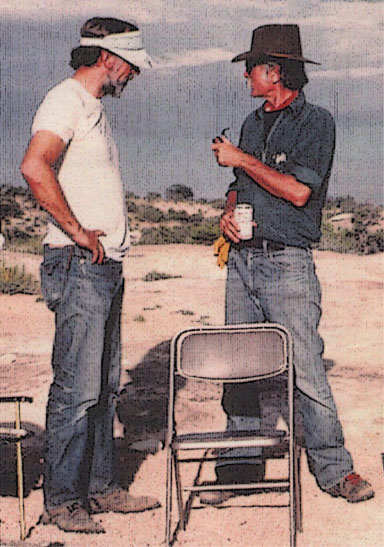
But when we both lived in Moab, and later when he came up from Tucson to visit, he’d stop by Arches to say hello (I was still a seasonal ranger living at the Devils Garden). We corresponded from time to time–back then, there was a means of communication, now almost extinct, called letters. Some of those letters, even Ed’s, were handwritten. I still have most of them.
De Puy also had a cabin in San Juan County–his ‘secret hideout,’ and Abbey spent a lot of time there, especially after one of his more painful divorces. I had a little hand-built shack not far from there. Abbey and De Puy frequently stopped by when we were all in the area
For much of that time, I admit I was intimidated by Abbey. I knew he was far smarter than me (and just about everyone else) —I was in awe of his intellect — and I worried that I would say something stupid, something that would diminish his opinion of me. I remember one winter morning, bumping into him at the old Yellow Front store on Main Street. I had just seen “Close Encounters of the Third Kind” and I had loved it. Abbey gave me the furrowed brow. “You liked that movie? We can’t even find intelligent life on Earth. If there are beings out there who have evolved, do you think they’d waste their time on us?” Then he just stood there, staring at me. The Abbey stare was indeed frightening. I wanted to crawl into my shoes. Abbey used his long glaring awkward silences like a weapon. We parted ways, and I felt like a bloody idiot, but a few weeks later, we were both at the post office. He was as friendly as ever. It was just Abbey.
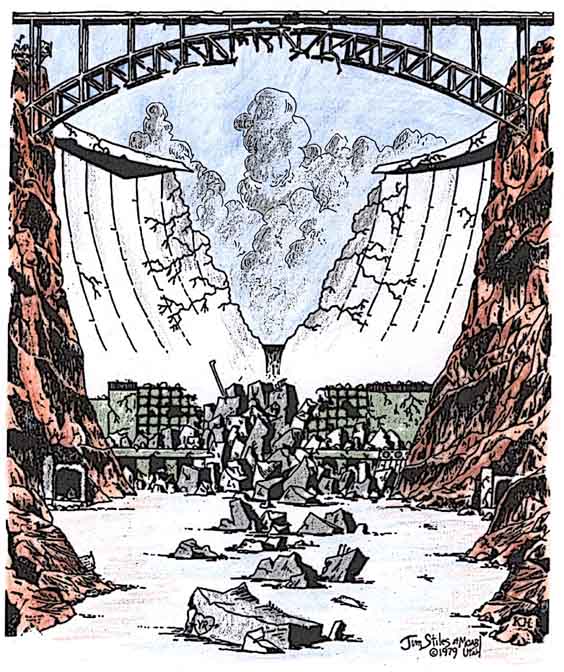
Abbey’s fame in 1977 was still on the cusp. His name was not well known beyond the West. He was, he liked to say, “A minor regional personality.” As he noted, people kept confusing him with Edward Albee. I’d mention Ed to a friend and he’d say, “Oh yeah..the guy that wrote that Virginia Wolfe movie. Abbey didn’t want fame to begin with, other than the fact that it was a great way to meet women. I think he wanted recognition for his work, but he hated the bullshit promotion that was required to get there. He’d find out soon enough…
*****
Three years before the publication of “Desert Solitaire,” Bob Dylan was already the iconic controversial figure that his literary cousin would eventually become. Barely in his mid-20s, Dylan was, in just a few short years, a household name around the world. In America, devoted fans and critics alike clung to every word he uttered. Every gesture was sure to have meaning.
Finally, a stiff middle-aged reporter with a mellifluous voice and a need to know asked about his role as a “protest singer.” He put it like this:
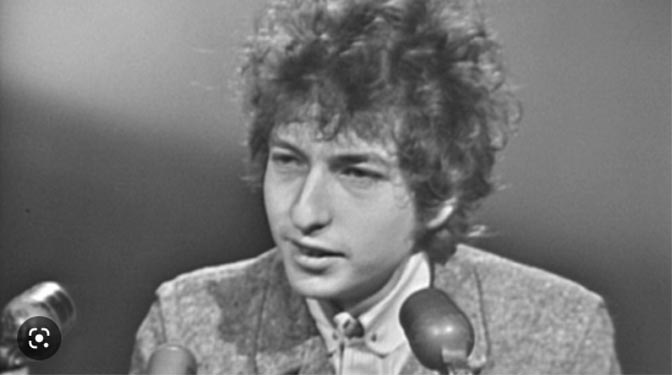
“How many people who labor in the same musical vineyard that you toil in are protest singers? That is, people who use their music and songs to protest the social state in which we live today, be it crime or war or whatever it might be.”
Dylan stared blankly at the reporter and seemed to give the matter some thought. “How many?…I think there are about 136.”
Just a trace of a smirk crossed his face. The reporter sought clarification.
“Do you mean about 136? Or exactly 136?
“I think it’s either 136 or 142.”
Reporters muttered and talked amongst themselves. A few got it. Many were still seeking further clarification. Dylan smiled his cryptic smile.
Years later, at a book signing, a fan approached Ed Abbey with her copy of Fool’s Progress. As the author scribbled his name across the title page, the woman exclaimed, “You know Mr. Abbey, I’m a novelist too!”
“Really,” Ed smiled (or was it a grimace?)
“Yes,” she boasted excitedly, “and I’ve been wanting to ask you a question. How many pages should a novel be?”
Ed stared at the woman a moment, his famous brow furrowed into a serious frown and he said without a hint of humor, “It should be 306 pages.”
The woman sighed in relief. “Thank God then…I’m almost done.”
This adoration and even deification of the Chosen Few is not a recent phenomenon and those rare recipients of the golden crown have, over the years and centuries, handled their celebrity and fame (or infamy) in a variety of ways and with erratic degrees of success. Some have wallowed in the Glory—it killed Truman Capote. Others like J.D Salinger fled–vanished from the public scene altogether, and still more, like Dylan and Abbey accepted their notoriety with reluctance and amused tolerance.
Ed Abbey would come to know exactly how Dylan felt. His legions of devotees have been as intensely and unshakably loyal as any rock idol could hope for. I should know; I’ve been one of them—by degrees— for 35 years, though over the years, my respect for Abbey came to be centered on his humanity, flaws and all, not on an edited or distilled or politically corrected version.
Posthumously his reputation as the ultimate provocateur continued to grow. At his memorial service near Arches National Park in 1989, Earth First! Founder Dave Foreman called Abbey “the mudhead kachina of the environmental movement and of social change…the trickster farting in polite company.” True enough.
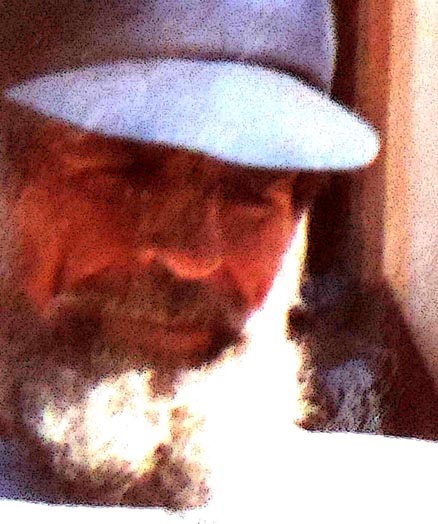
*****
But has Abbey’s myth, almost 35 years after his passing, become something distorted and disconnected from the real man and the life he lived? Have we selectively picked and chosen and subsequently disregarded his own words when they failed to reveal what we wanted him to be? Part of the confusion may have been his ability to willingly and unflinchingly, and even with great humor, contradict himself. It gave us the option of choosing which Abbey we preferred.
And now, in this –God forgive me for even using the word— in this “Woke World,” are individuals like Abbey being castigated and condemned for reasons that have absolutely nothing to do with his talents as a writer?
Complexities and contradictions can be found in almost any point of view and Abbey often offered both sides, though he didn’t always acknowledge the dichotomy. After his death in 1989, and for years after, it was his readers, his “following,” who preferred to edit and even sanitize the most provocative and sometimes disturbing opinions of their favorite author.
Abbey loved the art of provocation. He wasn’t just a trickster–he was a quipster. It was his passion, his entertainment, and his escape. At a time when straightforward, unvarnished–and especially earthy—opinions were hard to find, his candor was a welcome breeze, even when it turned into a maelstrom.
Watching Abbey take target practice was a delight to some and withering to others…he mocked politicians and political parties, religions, businesses big and small, tourists, developers…he spared no one.
Some of the most scathing satire ever penned about the Mormon Church came from Abbey, particularly in his portrayals of the novel’s antagonist, Bishop Love, and other rural Utahns in The Monkey Wrench Gang. Whether he meant to or not,
Abbey created, or at least embellished, a stereotype about Mormons that warms the hearts of the anti-Mormon community in Utah to this very day.
But while Ed mocked the culture and the religion and their sacred underwear and called them “Latterday Shitheads” from time to time, his other ruminations on the church might be disappointing to some of the church’s fiercest critics.
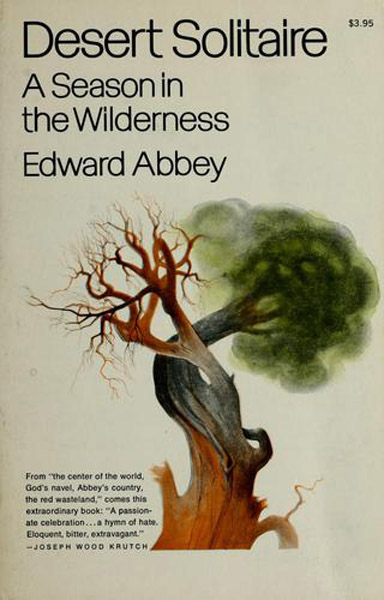
In “Desert Solitaire,” he came to the defense of his Mormon friends. “Leaving aside the comical aspects of their creed, “ Abbey wrote, “one can argue that the Mormons in practice achieved a way of life in which there is much to admire, much worth saving.”
He noted the peculiarities of other sects, “the Baptists with their insistence on total immersion…or the Jews with their prepuce-collecting Yahweh…or the Hindus with their sanctified ritual for nasal emunction.”
He even held to account, “the small town atheist, with his Little Blue Books and sneering jokes at ancient and venerable institutions.”
Bishop Love, the fictional San Juan County Commissioner/developer that the Money Wrench Gang squared off against was based, more or less, on the real-life, flesh and blood Calvin Black, familiar face and controversial politician from Blanding, Utah. I’d never heard of Black until he was revealed to be THE Bishop Dudley Love. Even Cal got a chuckle out of the notoriety. And while Cal Black became synonymous with environmental destruction and avarice and greed to Abbey’s many readers, Abbey couldn’t seem to hold a grudge. From Postcards from Ed, Abbey wrote to a young man in Blanding:
“Old Cal Black is not a bad guy. I’ve met him a couple times and I like and respect him as a person, as an individual. Of course, his dedication to industrial development, whatever the cost to other values, sticks in my craw. There we disagree—but not—I hope—violently.”
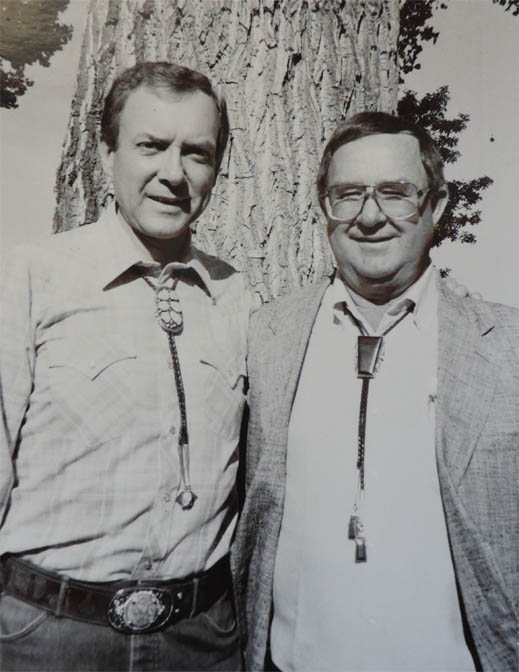
Ed Abbey and Cal Black remained the lightning rods of the public lands war into the late 1980s. But then, almost simultaneously, both men were struck down. Black announced he had inoperable lung cancer, a death notice Black and his doctors attributed to uranium exposure. He had worked the mines in southeast Utah, going back to the 1940s.
Abbey died in 1989, but a year before his own death, Ed received word that Cal was sick. Cal Black announced his retirement from the San Juan County Commission. The Deseret News reported that “the 60-year-old commissioner has inoperable cancerous tumors in his right lung and clavicle.” Clearly Black was dying.
The Southern Utah Wilderness Alliance was asked to comment. They could only complain, “He single-handedly has probably represented most of what the environmental community doesn’t like in public officials, which is insensitivity to the environment…It’s a shame Edward Abbey isn’t around to comment on Cal Black’s political obituary,”
In fact, Abbey did have a chance to comment. Though dying himself, Abbey learned of his old adversary’s terminal cancer and on December 1, 1988, penned a note to Cal. A few days later it arrived in Blanding. Abbey wrote:
Dear Cal,
I hear rumors that you’ve come down with a serious illness. If true I hope you beat it. Although you and I probably disagree about almost everything, you should know that I have never felt the slightest ill-will toward you as a person. Furthermore, you still owe me an airplane ride. Good luck & best wishes.
Ed Abbey
Sometimes Abbey seemed to disconnect his public utterances from the effect they might have on his friends. It’s as if it never occurred to him that his broader strokes might affect the individual. In 1985, for example, he went after the myth of the American cowboy: “Western cattlemen are no more than welfare parasites,” he railed. “They’ve been getting a free ride on public lands for more than a century, and I think it’s time we phased it out. I’m in favor of putting livestock grazers out of business.”
“They’ve had their free ride,” he added. “It’s time they learned to support themselves.”
But word came to Abbey the next year that some rancher friends of his had been offended. Ed was quick to contact them. “It would do no good to apologize for what I said about cowboys and ranchers…and it would be false on my part, because I really meant what I said.”
But he noted that he’d acknowledged exceptions to his otherwise all encompassing cowboy condemnation and hoped they realized he was referring to them.
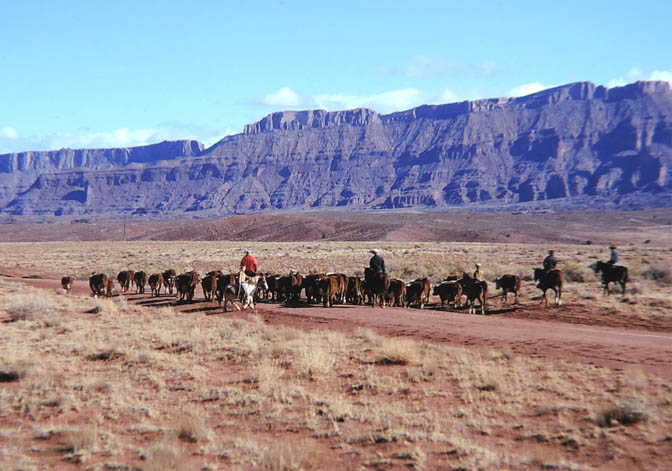
“I have always admired and respected you people—all of you, the whole family—and hope we can continue to be friends.”
He once wrote that “there is nothing smaller than a small businessman,” but some of his lifelong friends ran small businesses. Ken Sleight—Seldom Seen— was the quintessential small businessman, with his pack trips and bookstores. Ed harangued the National Park Service and its lazy loafing bureaucrat/rangers. I was one of those rangers. I knew…it was just Abbey being Abbey.
And in the last year of his life, Abbey wandered into a fashionable professionals-type bar on a hot Friday afternoon and gazed through an air conditioned haze at the sea of suits and ties that filled the room.
“Damn!” he exclaimed. “It smells like lawyers in here.” Yet one of his good friends was Bill Benge, a Moab attorney and his “legal consultant” when he wrote the last chapters of The Monkey Wrench Gang.
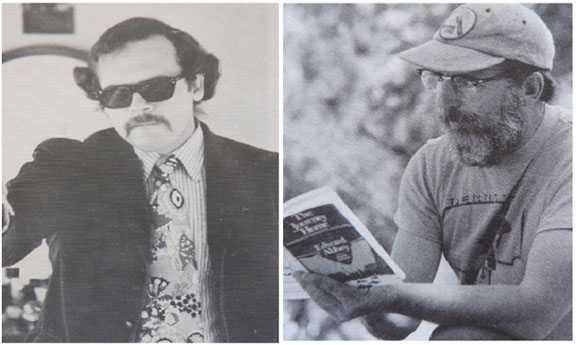
He rarely meant to insult anyone, and in most cases, he didn’t. But he sometimes failed to connect the dots that traveled from his rhetoric to real life.
Some have suggested that Abbey fell back on his own self-label of “entertainer” to explain away his brash and sometimes shoot-from-the-lip outspokenness. One Abbey critic/friend of mine complained to me about both Abbey and Bob Dylan and their fans. He wrote,
“The acolytes want to take every asinine utterance of Abbey’s (and he has lots of them) discuss them as if they were filled with deep insight. What I disrespect most about both Dylan and Abbey is their laziness in wanting to have it both ways. Both at times used the “I’m just an entertainer” defense when trying to rationalize their lesser works. But they both damn well wanted to be taken seriously. And it’s this sort of apologist attitude that just gets me …. excusing sloppy thinking and lazy work with the …. “Oh Ed’s just being a clown or a provocateur”. At the end of the day this is more a complaint about Abbey’s followers than Abbey himself (although he carries some of the weight as far as I’m concerned).”
His complaints about those “acolytes” are on the mark, from where I stand. Their often mindless devotion to Ed at his wise-crackiest would have offended him. But while Abbey the Quipster was often prone to embrace the crowd pleaser line and the stinging remark, when it came to the matters he cared most about, he took his time and he stood stubbornly and defiantly behind the weight of his convictions. He rarely, if ever, fled a point of view that really mattered to him, like his controversial views on immigration and population. Not only did he defend himself, he’d climb over the Alamo wall, looking for somebody to argue with, regardless of the consequence. For those who knew Abbey in those final years as his views on immigration generated accusations of xenophobia and racism, they know the consequences he endured.
Ed Abbey was not one to cower. But he picked the fights that mattered and laughed off the ones that didn’t. Who can be painfully earnest 24 hours a day?
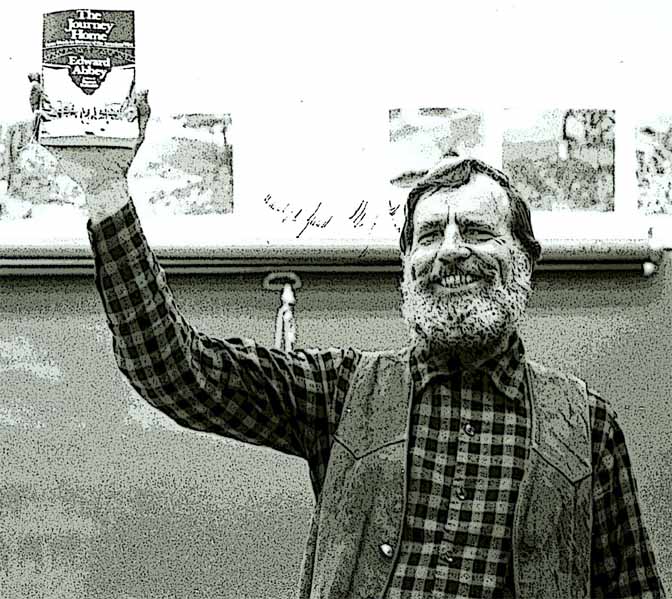
If Abbey’s words challenged or confused or caused consternation for his readers when he was alive, the posthumous Ed Abbey left many of his fans ducking for cover. Five years after his death, a volume of his journals, Confessions of a Barbarian, edited by his friend David Peterson, was published.
According to Peterson, the idea that the general public might be interested in his papers seemed far-fetched to Abbey when the University of Arizona first sought to include them in its Special Collections Library in the 1970s. But he reluctantly agreed and over the years, according to Peterson, he would visit the collection occasionally, “lining out entries or writing second-thought notes here and there.” Years later, a second volume, Postcards from Ed, a collection of his letters and cards to friends and foes and fans was published, again edited by Peterson.
One thing is certain, Ed Abbey knew that someday, perhaps years after his death, many of his most intimate, heart-felt, unvarnished words and opinions, expressed over 35 years in those journals, would become the subject of even more debate and dialogue. And maybe that was his last hope and aspiration—to generate one more good, hotly argued, albeit posthumous, controversy.
It was like Abbey speaking from the grave:
Okay, you’ve been trying to ‘interpret’ me for a quarter century. Now..here I am, open to the bone. The real Edward Abbey. Now, who do you think I am?
Devoted readers raced for their blinders. Was this Abbey’s last joke? And was it on us?
The journal entries were revelatory and expansive. But it made his fans…uncomfortable. His subject matter filled the spectrum…and became much more inclusive. As more liberals and mainstream environmentalists turned on Abbey for his views on immigration and population, for example, the more bitter he became. He wasn’t particularly thrilled to be revered, but now he was being called a racist and a white nationalist.
Just two months before his death, a particularly nasty review of “Fool’s Progress,” put him over the edge. In his journal he wrote:
“Never thought I’d be attacked from the point of view of the most standard, doctrinaire, conventional chickenshit liberalism–but this is it. Exactly the kind of cant and sham and hypocrisy, intellectual dishonesty and moral cowardice, that has turned me finally against ‘liberalism’ in general.“
It was his last salvo. Two months later, Abbey was gone. For years after he died, Ed’s more controversial quotes vanished. Like JFK, “Abbey the Man” ceased to exist. He became the Myth.
It was rare to see any of Abbey’s most candid quotes appear anywhere in the social media, on the various Abbey Groupie pages, or in any popular reviews of his work. For those who think it’s somehow disrespectful to include Abbey’s candor, fail or refuse to recall that it was Abbey himself who allowed his journals and letters to be published. He wanted them to be read and discussed. He did not want them sanitized. That’s who Edward Abbey was.
*****
Whenever I saw Abbey, it was usually in Moab or Arches. He sold his Moab home in 1980 and moved to Tucson, but he and Clarke often came back in the summer, to beat the Arizona heat. Especially in those last few years, he often invited me to join him on a backcountry trip, usually with his best friend De Puy. But I could never get away. Several times he invited me to Tucson to stay with him and his family at their home south of town. I guess it was just my own timidity and lack of self-confidence, but I always chickened out. I once made it all the way to Tucson, and even saw the El Moraga turnoff. But I kept going. Coward! I yelled at myself.
But finally, in 1988, he and Clarke both insisted that I come down for a few days. I gathered my courage and accepted the invitation. I arrived in Tucson late in the day, and I had not been specific about my arrival time, so I got a motel room that night. The next morning I drove to their home, still a little nervous.
Ed came out to greet me. “You’re here early,” he said. Did you drive all night?”
“No,” I explained. “I hadn’t told you for sure when I’d get here and I thought it might be sort of rude. You may have had other plans.”
He gave me the furrowed brow. “That’s ridiculous.” By now Clarke had joined us. “Stiles stayed in a motel last night. Can you believe that?” He patted me on the back and said, “ From now on you are staying here. You can sleep in my studio. We wouldn’t have i any other way.” He acted annoyed but I think he actually appreciated the fact that I was trying to be thoughtful.
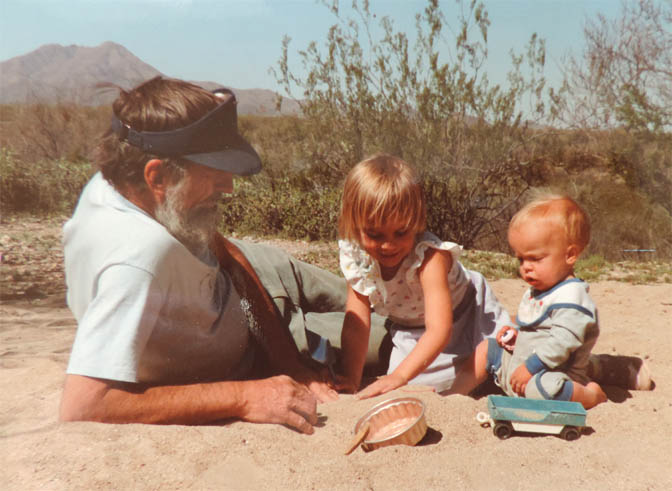
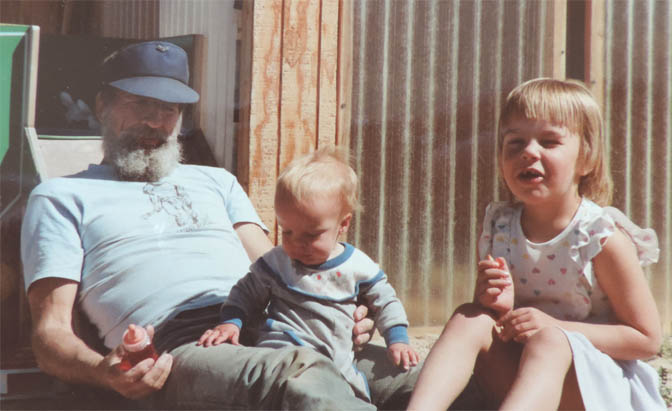
I stayed two or three days. One day, Clarke assigned us the job of babysitting Becky and Ben. Seeing Ed Abbey in a sand box playing with toys was a sight to behold. The previous day, we went to a ball game. Both of us were baseball fans and Tucson was the spring training camp for the Cleveland Indians—now the “Guardians” another woke change that would have infuriated Ed. It was an afternoon game against the Giants at Hi Corbett Field, and we blasted along Speedway Blvd in his politically incorrect 1972 red Caddy convertible (top down) with the white leather interior. I can’t recall what led to it, but somehow we got into an argument, the only dispute I ever recall having the courage to challenge him on.
The topic was over-population. And the human race. We agreed there were “too many damn people,” but somehow I found myself defending individuals of the species. Nobody specific. My argument was that there are many good people, including “individuals” that other people might loathe. I saw no way, short of an asteroid, that was going to change that. And don’t misunderstand; I’m not praying for an asteroid either.
For a few moments, he seemed genuinely disgusted with me. He snarled, “What the hell has happened to you Stiles? Have you become some goddamn bleeding heart liberal? Ninety-percent of all humans are scum and should be lined up against a wall and shot.”
It was classic Abbey. I didn’t even take him seriously which probably annoyed Ed even more..
I laughed and replied, “If you lined up ninety anonymous humans against a wall, there’s no way in Hell. on your worst day, that you could shoot ninety of them. You’re just doing your Abbey Thing.” I couldn’t believe I even said that. We drove the rest of the way in silence. When we got to Hi Corbett Field, he pulled to the curb and said, “You go buy the tickets. I’ll park the Caddy and meet you at the entrance to the ballpark.
It was a short walk to the ticket office. I got our tickets and waited for Ed. And waited. And waited. No Abbey. Good God, I thought. Did I make him that mad? Has he abandoned me? Another five minutes went by. Finally in the distance, I spotted the distinctive dirty white sombrero with the beer tab hat band. The scowling face and the red bandana.
I said, ‘What happened? Where have you been?”
He growled, “I told you there were too many damn people. I had to park the Cadillac a mile away to find a parking space.”
I said, “Well, if you didn’t own a car that was 32 feet long, you might have had better luck.” I was finding courage I didn’t know I had.
Ed finally laughed. The scowl receded and he said, “But Stiles, if the world wasn’t so screwed up, what would I write about?”
We went to get our hands stamped to buy beer and had to show ID. The woman actually asked for mine. I was 38 years old. Abbey said, “And I guess you think I’m his goddamn grandfather.” The sweet little stamp lady smiled and said, “Oh…are you?”
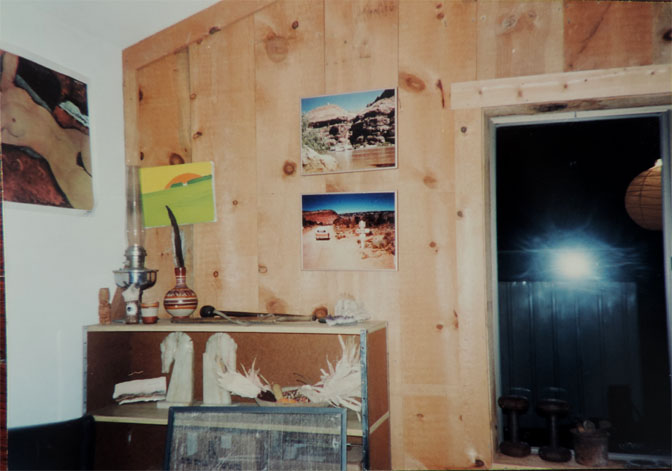
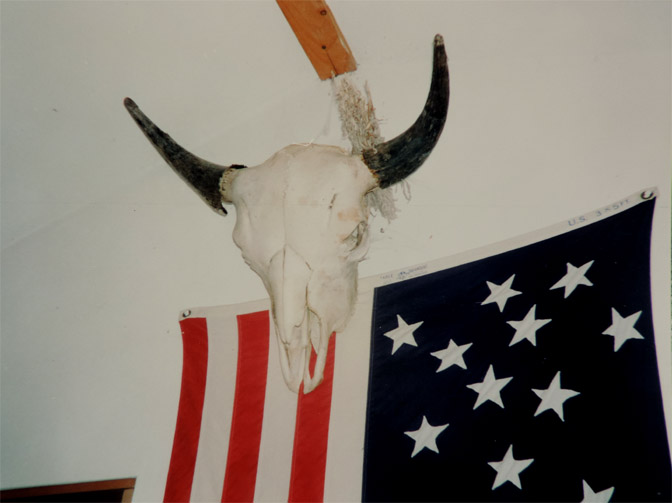
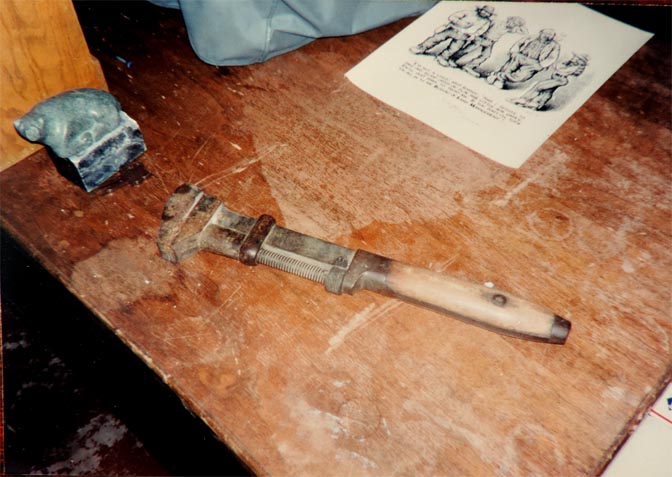
We sat in the bleachers and Abbey drank his first beer in two years. His health was declining; I could see it . He looked gaunt and tired. As a consequence, he’d given up the booze. “But,” he said, “damn that tastes good…you’re corrupting me Stiles.” We talked throughout the game. I have no idea who won. We went back to his place and to his studio and continued the conversation. And yet for the life of me, other than our brouhaha in the Caddy on Speedway Blvd, I can’t remember anything specific from the conversation. Well. other than the fact that we both agreed the world was indeed going to hell and there wasn’t a damn thing anybody could do about it. Now I realize it’s important to add…the world as we know it. The truth is, what the world wants now bears little if any resemblance to the world we longed for. I do recall him saying, “we were both born too late.”
In the evening, as we were walking back up to the house, he stopped to split some wood for the fireplace. The light was just right and I finally gathered the courage to ask if I could take his picture. I had never tried to impose on him, but he was agreeable, and so he sat down on a stump and I snapped a couple photos. Later as I looked at the pictures, I noticed that while he’d been careful to wear work gloves, he was splitting wood with a double bladed axe in his bare feet, Years later, I told DePuy the story. “That figures,” John said. “To tell you the truth, Ed could be sort of a klutz. America’s greatest outdoorsman and he chops wood with no shoes.” De Puy paused a moment. “Damn I miss that old bastard.”
Years later, I realized I’d taken the picture on March 14, 1988. Ed died a year later to the day.
****
Now on the afternoon of March 11, 2023, almost 34 years after his departure, Abbey Lives— he is still remembered. Still absurdly revered by many and unjustly loathed by others. Just recently, in this loathsome, woke, artificially enhanced society, where three quarters of the U.S. population can’t locate Texas on a map, or name the three branches of government, and think George Washington was president during World War II. Abbey’s myth is being revised yet again. This is not the world and the West that we cherished and loved. The New West is not even remotely compatible with his vision of wilderness and wide open spaces.
In “Desert Solitaire,” Abbey offered a unique reason for establishing wilderness. “We may need wilderness someday,” he proposed, “not only as a refuge from excessive industrialism but also as a refuge from authoritarian government, from political oppression. He warned that “technology adds a new dimension to the process,” and believed (then) that the wilderness would provide escape from those kinds of Big Brother controls. For Abbey, wilderness was meant to be the one vast “blank spot on the map,” as Aldo Leopold longed for.
Today, he would not recognize the wilderness he sought to protect (though in his journals, in 1987, he had already complained, “Too many tourists in the backcountry now.”)
Environmental groups, once dedicated to saving the wilderness that Abbey envisioned, now look at wilderness as a commodity to be marketed. What is the economic value of wilderness? Environmentalists promote the notion of a swarming tourist economy. They’ve taken a favorite Abbey line: “The idea of wilderness needs no defense; it needs more defenders,” and turned it into a Chamber of Commerce promo….the more money that can be made from the product, the greater the chance, in their estimation, of passing wilderness legislation. Nevermind what gets destroyed in the process.
Even grassroots groups, who once worked for the protection of the land and the satisfaction that they were honest participants in “the good fight,” now parse their battle cries and make a $150K a year. Their boards of directors are filled with wealthy fat cat industrialists who today, would have had Abbey deported if they could find a way. (and if he were still alive!) Together, they support a massive recreation/amenities economy that brings millions of tourists to the once remote rural West and with it, untold quantities of money and environmental devastation.
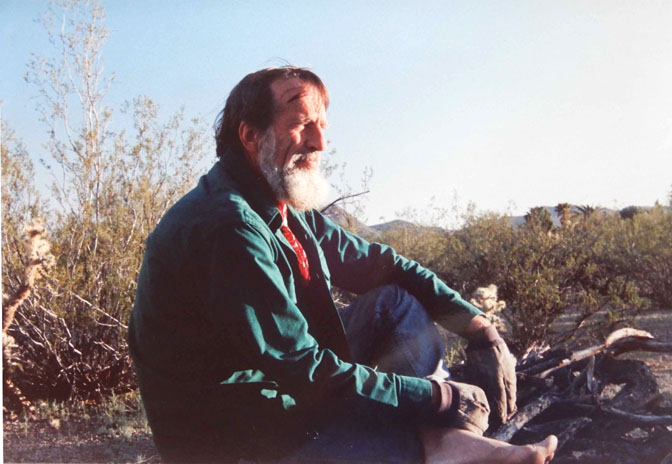
Adrenaline junkies from the far corners of the planet descend on the canyon country to string slacklines, and rock climb and ride bikes off cliffs and BASE jump and ‘do’ the river..
Abbey used to talk about “a loveliness and quiet exultation.” Nowadays exultation makes a lot of noise.
When Abbey talked about seeking wilderness, he admonished us, “to walk, better yet crawl, on hands and knees, over the sandstone and through the thornbush and cactus. When traces of blood begin to mark your trail you’ll see something, maybe.” When he talked about riding bicycles, he imagined them as a replacement for cars, not feet. He did not envision luxury “adventure tours” and hand-held guided hikes to “remote locations,” barely a mile from their cars.
Abbey wrote, “We don’t go into the wilderness to exhibit our skills at gourmet cooking. We go into the wilderness to get away from the kind of people who think gourmet cooking is important.”
And he didn’t envision a wilderness experience that included cell phones, smart phones, GPS units, or daily uploads to Facebook (“Here’s what our sunset looked like tonight! Here in the WILDERNESS!” —–126 ‘LIKES’)
Many of these recreationists convince themselves they are the latter day disciples of a man they knew practically nothing about, or bothered to know. In 2023, there is even more change in the air. Today’s young people are not nearly as enamored with Abbey as their parents were. Even decades ago, he was often attacked for being against “Progress.” He’d reply, “That’s not true. I’m not for keeping things the way they are. I want things to be like they were.”
He once said, “ If America could be, once again, a nation of self-reliant farmers, craftsmen, hunters, ranchers and artists, then the rich would have little power to dominate others. Neither to serve nor to rule. That was the American Dream.”
Many of the older New Westerners love Ed Abbey but have no idea what that means. They’ve read all his books and they follow and “LIKE” his quotes on Facebook, but they understand far less than they realize. Many of the younger New Westerners are too busy recreating to care. Solitude isn’t even a priority. (And please note, in the spirit of Abbey, I’m generalizing here and judging a generation who I know has its own shining stars. If there is any hope to be found, it is in those young people.)
What Abbey always hoped we’d take away from his writing and from his life was a sense of ourselves as individuals, as men and women who could take control of our own lives and our own destinies. Abbey spoke disapprovingly of a “nation of bleating sheep and braying jackasses.” He longed for a people with dignity and courage and he loathed the mindless “bleating” that he found even in his own readers.
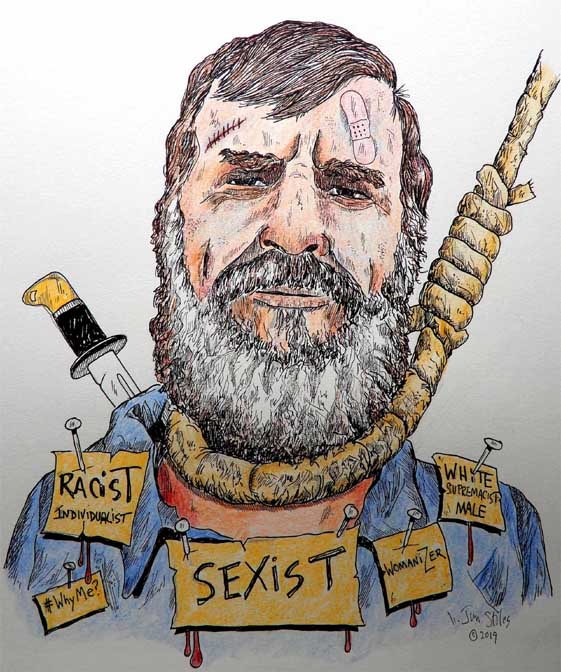
*****
A few years ago, an angry feminist/environmental activist wrote a book for an angry feminist publisher; the book was touted and publicized as the sequel to “Desert Solitaire.” The author confiscated half the book title and literally commandeered every chapter title in Abbey’s masterpiece. It was like reading a book written by someone with a multiple personality disorder—one minute she was spewing obsequious praise on Abbey, Then, in the next breath, the little booklet would transform itself into a condemnation of the man she supposedly admired, The book was a bewildering assault on all the personal vices he allegedly possessed, and an unhinged screed against men in general..
More than anything, the book condemned the spirit of individualism that was fundamental to Ed, and called for a new “collectivism” to replace it…It was a book meant to marginalize and diminish and Ed himself.
In 2019, The Zephyr offered a rebuttal to the booklet. It was brilliant and I was never prouder to publish it.
(My only regret is that the author is now my ex-wife, for reasons she could never articulate and I will never understand. Maybe, as she has written since, Tonya wanted to “disappear.” I hope she finds the peace that eluded her here. But that’s a story for another time. In any case, she is no longer part of The Zephyr. but this was one story I could not bring myself to remove from the archives.)
In part Tonya wrote:
“(The author) seems to believe that Individualism represents some grave and overwhelming threat in our modern world– that it is “draining the world dry,” in fact. But I can find nothing in my own experience to support her. She thinks we need ‘intimacy’ more than ‘privacy.’ Has she noticed what’s happened to privacy in the last 20 years? She thinks we need ‘solidarity’ more than ‘solitude.’ But, as it is, we can hardly hear ourselves think amidst the jangling and the clanging, the beeping and babbling din of people around us.
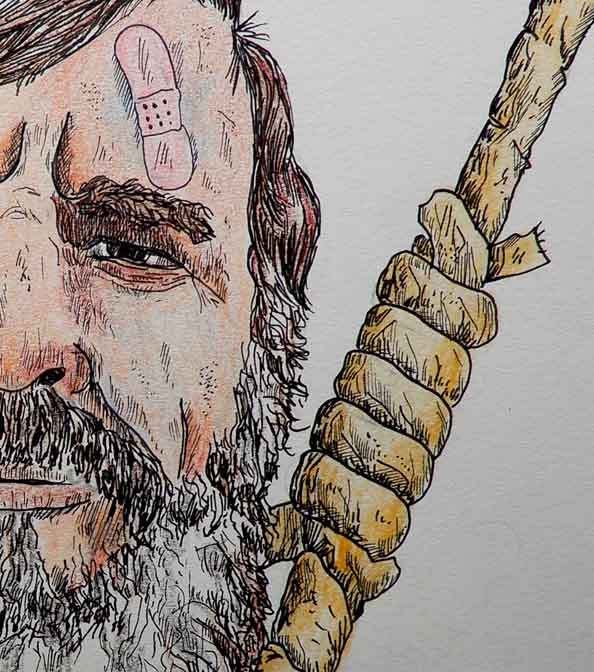
“Surely, we don’t need more consolidation. And we don’t need more groupings. The whole grinding machinery of the world is pushing us into little collectives—so that we can be more easily advertised to, and pandered to, and convinced that we are absolutely 100% right about everything, while that other group is absolutely 100% wrong.
“We don’t need any more homogeneous proper-thinking neighborhoods, or more towns that look like a million other towns. We don’t need more people who think just like every other person in their cabal. We don’t need another cabal. Goddammit, what we need are more caballeros!
“This is a time for individuals—rugged or otherwise. And Desert Solitaire remains as powerful a case for compassionate and observant Individualism as it was 50 years ago. Ed doesn’t sound like anyone you can follow on Twitter. (Thank God!) As he wrote in his journals, ‘The one thing both conservatives and liberals, Left and Right wingers, hate, is a free-thinker, a nonconformist. From either side. Unless you subscribe in every detail to one doctrine or the other, you will be denounced. Look at me.’”
For a link to the entire story, click here. And be sure to read the record number of comments.
Perfect. And Abbey is as right today as he was then. In 2023, not only would he be denounced, I doubt Ed Abbey could even get published.
Once someone asked Abbey how he would label himself. He replied, “If a label is required, say that I am one who loves unfenced country. The open range. Call me a ranger. Though I’ve hardly earned the title, I claim it anyway. The only higher honor I’ve ever heard of is to be called a man.
”(In 2023, even labeling someone a ‘man’ can get you shot.)
Abbey may have hoped, when he left this world, that his time and effort here might have made a small difference, that it might alter the future for the better in some minor way. Or as he liked to say, “,,,make people THINK, if that’s possible.” But probably not. He saw all this coming, and just as he predicted —it’s here. As for his deification in the years that followed Ed’s death, no one was more annoyed than his friend Chuck Bowden. Bowden himself wrote a short tribute to Ed called “The Red Caddy,”
In the book’s introduction, Novelist Luis Alberto Urrea wrote, “Chuck railed against what he called the ‘Dead Ed Industry.’ … He complained that people who had once drunk a beer in the same cantina as Ed were now claiming to be his best friends, and were offering to take people to Ed’s unlawful burial spot somewhere out there near the Devil’s Highway.” To quote Bowden, “It’s very depressing to know and like someone and then have them die and be made into a saint.”
Maybe the Woke Society of 2023 will ultimately strip Abbey of his deity status. That might be the one event in the future that could put a smile on Cactus Ed’s face. One thing for sure, after 34 years, we still miss you Cactus Ed.
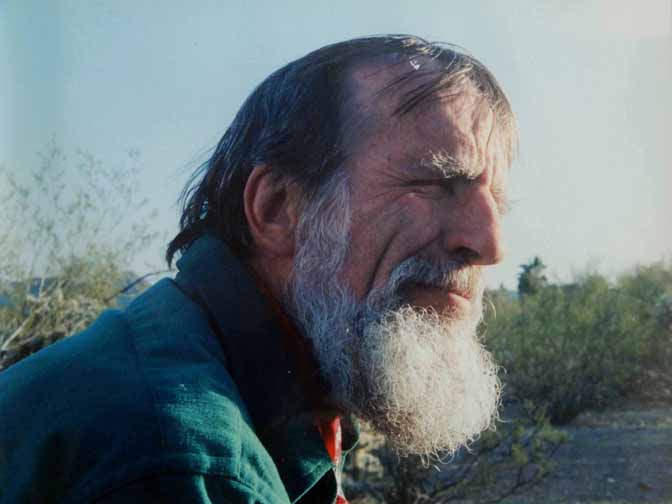
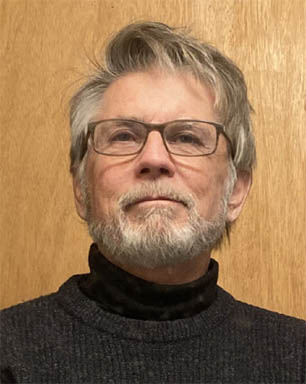
Jim Stiles is the founding publisher and editor of The Zephyr. Via The Zephyr, he has been “clinging hopelessly to the past since 1989.” He can be reached at:
cczephyr@gmail.com
TO COMMENT ON THIS STORY, PLEASE SCROLL TO THE BOTTOM OF THE PAGE.

BE SURE TO LOOK IN THE PROMOTIONS FOLDER…Gmail INSISTS!!!
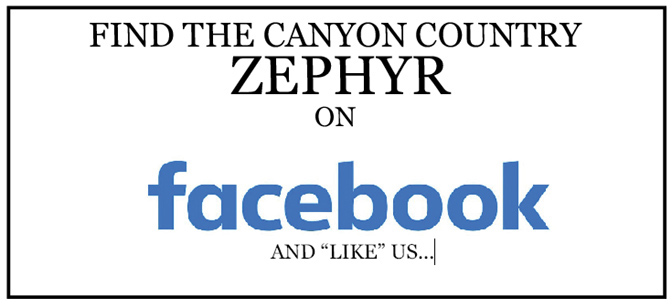
Why they can’t just leave the site alone is beyond me,
but that’s what Facebook likes to do.
ALSO NOTE: I post old photographs and stories from our 25 year old archives every day. Pictures from Herb Ringer, Edna Fridley, Charles Kreischer.. even a few old photos from my Dad. So if you want to stay caught up on our amazing historic photo collections,
be sure to “follow” us on Facebook…Thanks…Jim
https://www.facebook.com/FansoftheCanyonCountryZephyr/
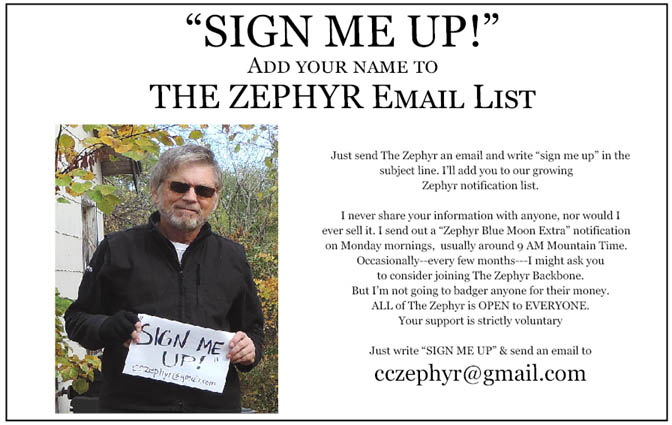
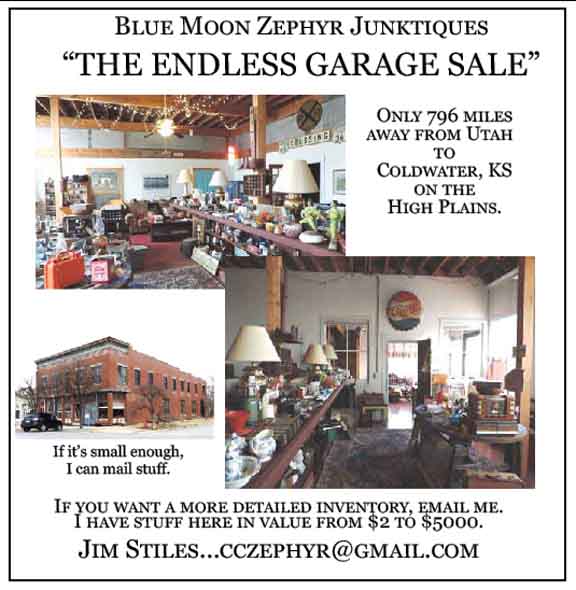
https://www.facebook.com/profile.php?id=100086441524150
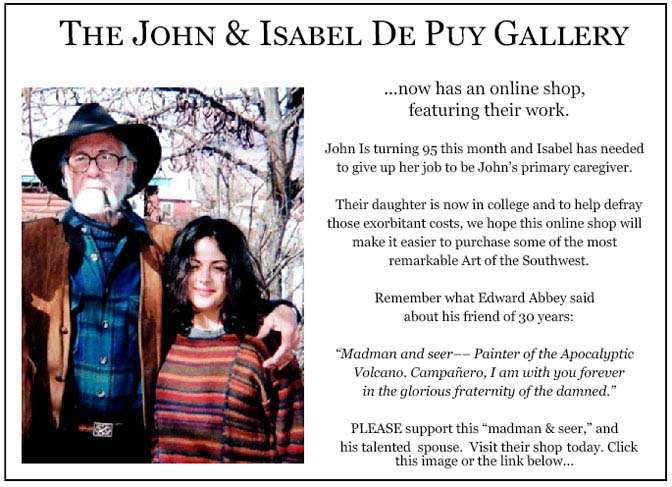
Thanks to them, our bills were almost completely covered.
Now I’d like to return the favor. Check out the link below and their online shop… JS
https://www.depuygallery.com/shop.html
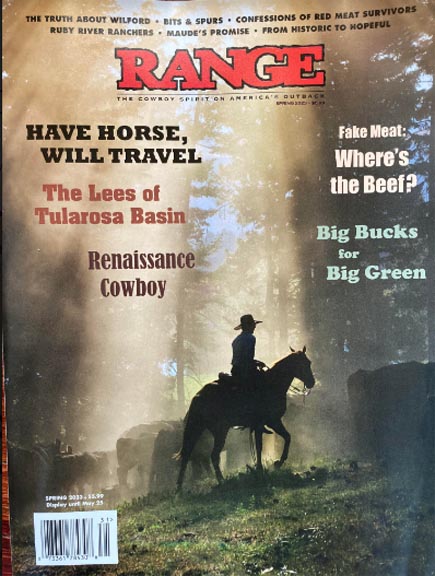
https://rangemagazine.com/subscribe/index.htm

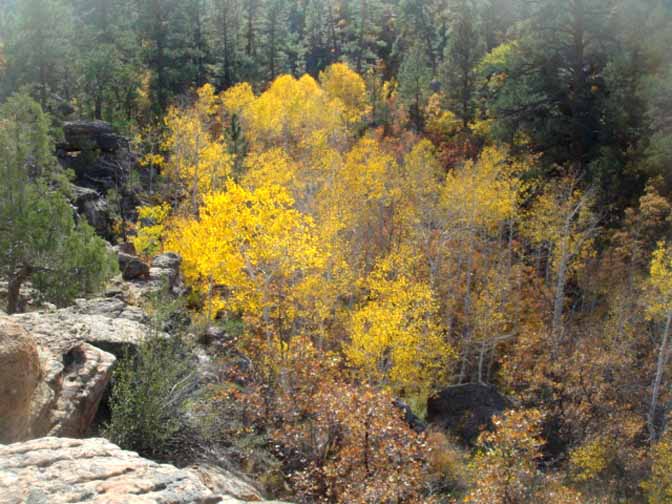
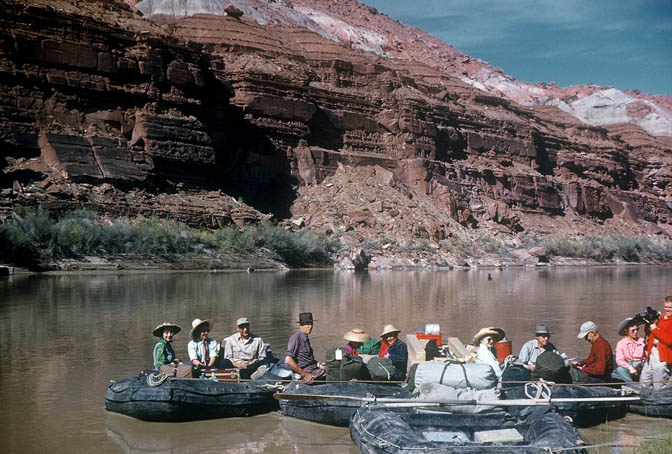
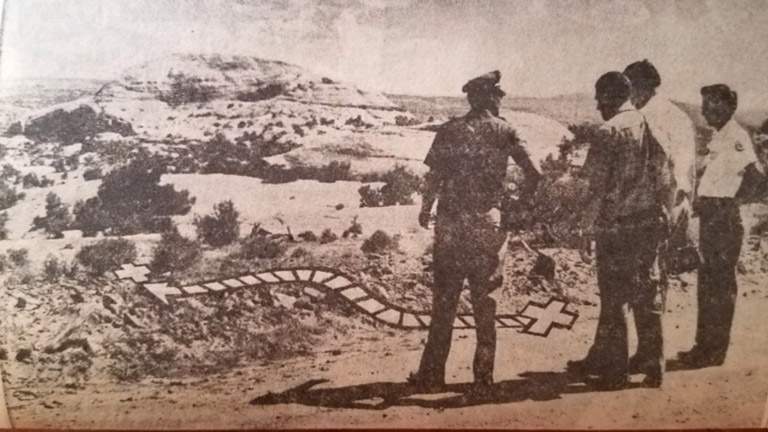
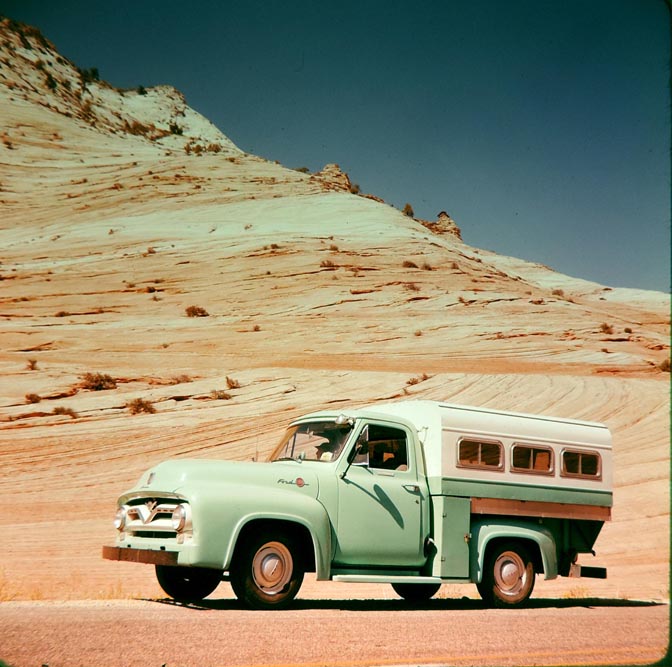
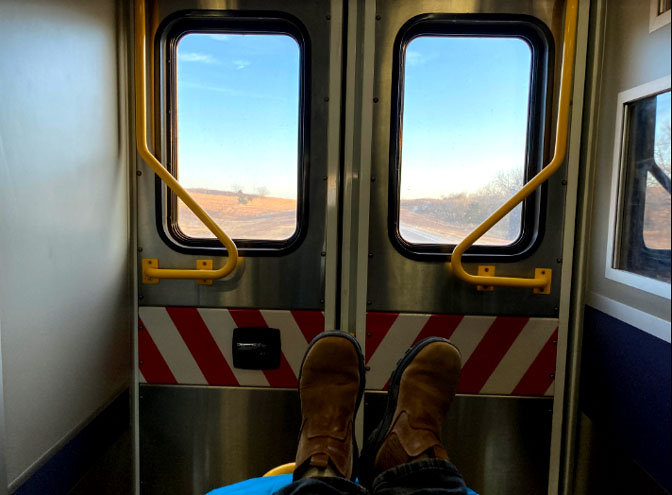
https://www.canyoncountryzephyr.com/2022/08/07/grief-meets-orwell-the-cuckoos-nest-by-jim-stiles-my-recent-encounter-with-the-mental-health-industry-zx20/
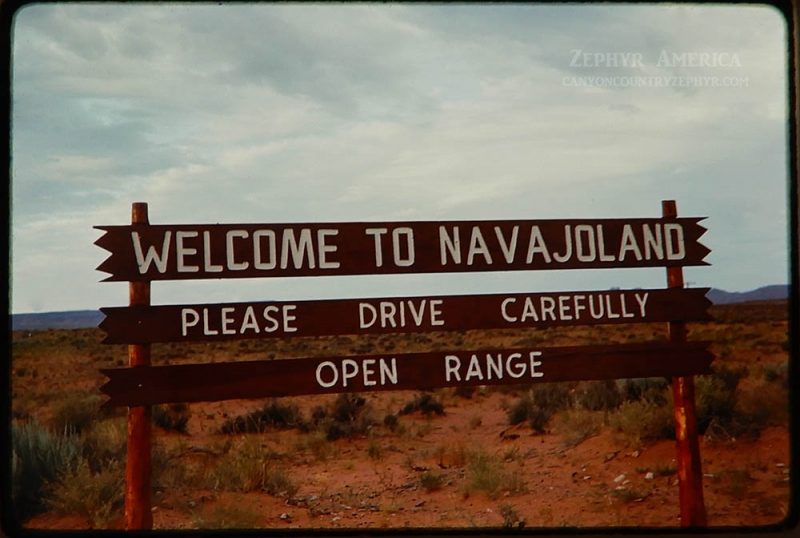

FREE
https://www.canyoncountryzephyr.com/



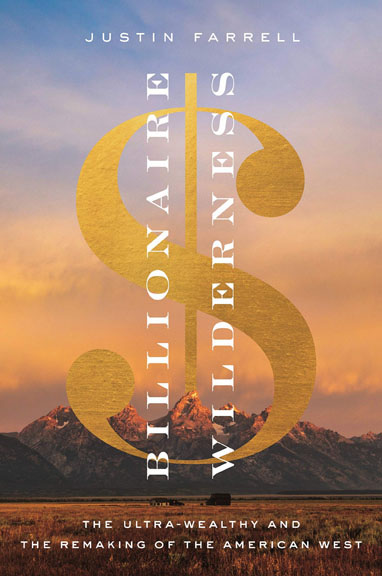

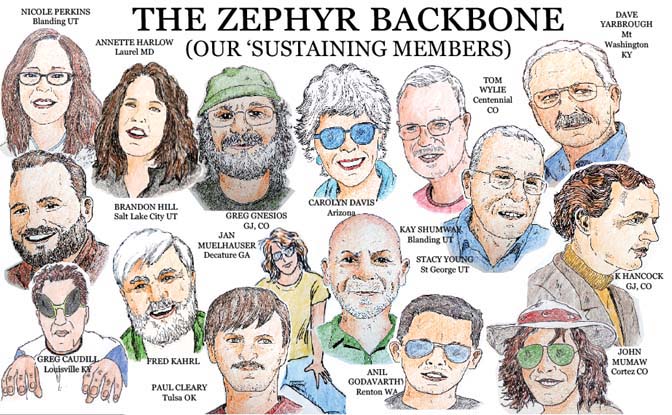
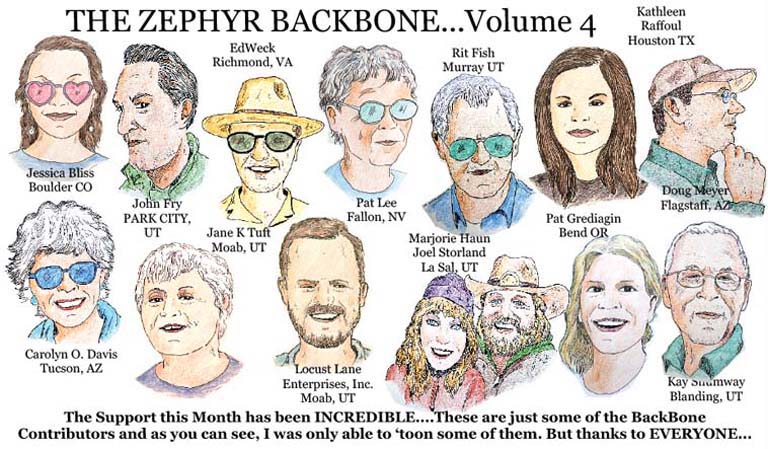
A little booklet of Ed’s musings has permanent residence in my pickup truck. Thanks for this story Jim.
The Monkey Wrench Gang was in my library from the time it came out! I’d read Desert Solitaire but didn’t keep it, I’d passed it on. Your photos taken with his bare feet were the very best I’ve seen of Edward Abbey. Of course I didn’t/don’t agree with everything he wrote, but his views into excessive building were right on spot! I wrote to a politician now seeking another office, saying I would financially support her if she’d say NO to further building permits in our DESERT area where water used to rise from the ground in flowing streams and now an adjoining lake is dying! No answer and that was a couple months ago. Every vacant piece of ground in our area is being built upon. Multiple story buildings/hotels rise, prices exceed most incomes but there’s a roaring tourist industry! Evidence of mountain lions and wildcats in “residential areas’ are frequent as their territory is encroached upon.
Excellent piece Jim. I’ve posted it to a group of Ed “Deifiers” who hopefully will take it to heart.
Thanks Warren. Oddly, I rarely see anything on that page related to Ed…But it’s the times we live in. Post a pretty picture? BOOM …300 “likes.” But post a story? Something that requires a few minutes to read? Hardly touched. I actually joined that site so I could post a story about the Nielsen’s Farm at the Hite Ferry in Glen Canyon. A place that was near and dear to Ed. I had never heard that story, nor had I seen the photos that their granddaughter was so gracious to share with me. I thought many “Abbey Matters” followers would find it worth looking at. Nope. Twenty likes. Out of almost 10,000 “followers.” What does that tell you?
Interesting story. I have a lot of Ed Abbey’s books (ordered them from Amazon for pandemic-isolation reading). But I’m confused by the caption under the photo of Orrin Hatch and Calvin Black. It says they were political adversaries. From the article, Abbey said (in a letter to a young man): “Old Cal Black is not a bad guy. I’ve met him a couple times and I like and respect him as a person, as an individual. Of course, his dedication to industrial development, whatever the cost to other values, sticks in my craw. There we disagree—but not—I hope—violently.” Seems to me that Orrin Hatch has also been in favor of industrial development; he has done much to block wilderness designation of a large amount of red-rock country, much of which consists of obtaining mineral-development leases in the red-rock land. So were they really political adversaries?
Both Black and Hatch were political adversaries of Abbey—definitely not against each other. I didnt mean to confuse you,
Ah, thank you for the clarification! Makes sense now. Keep up the good, thought-provoking essays, Jim!
I read that line as meaning that they were Ed Abbey’s adversaries.
Yes, I misinterpreted it (see above reply I made to Jim.) Thank you.
It’s obvious what it tells you. We live in a society of immediate gratification for the dopamine fix. Algorithmic opportunists are driving the train that never stops at a station.
Great piece, Stiles, full of nuance and understanding which, in this day of right and wrong, black and white, woke and unwoke, is in exceedingly short supply.
I say this as someone who loves Abbey’s work. “Desert Solitaire” was one of the most important books in my life. I reread it every few years, usually while burning gas in Utah trying to find a place that is quiet (that’s over) and where I can find solitude (travel in December), like so many others.
The one thing I never like about Abbey’s work is precisely his crotchety emphasis on individualism. If one thing will never save us, it is that.
Tonya Stiles’ review complains that we are all being driven into “little collectives”, and I wouldn’t disagree: but those are mere collectives of demographic categories for marketing purposes, as she points out. They are loose aggregates of sad little individuals who are all the same.
But what she fails to see–and what Abbey fails to see–is that his brand of individualism, his idiosyncratic self, was as much a product of history as anything else. Yes, he wanted to protect the wild–thank not-god for that! But he also wanted to be the guy who drove across it in his pickup truck so he could slide down a snowfield on a rock, all alone. There’s a basic contradiction there.
What we have now is what happens when 10 million “individuals” want the same thing. (And how free and unconstrained are we as individuals anyway? The author of this piece trots out the clichéd stereotype (redundancy intended) of the “angry feminist”. A “free” thinker might not like to use a term that is so well-worn, so easy to automatically set down in digital print. Come on.)
That said, I don’t think Desert Cabal is written well, not at all. Didn’t Abbey say somewhere something like “there’s nothing worse than bad writing” and really mean it? There is the great line from Seinfeld, when the priest asks Jerry if he is offended “as a Jew” that his friend Watley has converted to Judaism to be able to tell Jewish jokes. Jerry replies, “No, I’m offended as a comedian!” Abbey wouldn’t be offended by Desert Cabal for its takedown of him; he’d be offended as writer.
Don’t get me wrong: I detest what has happened to the wilderness these past many years. But I see no need to continue to defend rugged individualism as the way to save it. As Theodor Adorno said in 1947, individualism is determined “in its innermost essence” by forces from without, namely the almighty commodity form and the demands of an economy founded on the sacred principle of private property.
In any case, keep on keepin’ on. Long live the Zephyr!
Thanks for your commentary … I feel much the same. Ed was born 6 years after my own dad; so it’s easy for many to judge him by the standards of today. Sure, I find myself offended by some of the statements in his books, particularly about women (although he gives them much backhanded praise as well). Like you, I also am turned off by the hypocrisy of some of his statements vs. his actions; but, once again, for all of his intelligence, he was to a certain extent a product of his times. Have a good one!
I will posit the the opposite of individual is collectivism. How much of one will you give up for the other? How much will you demand others to give up, presumably to conform to the collectivist goals you support? And exactly what goals are they?
If people are not as free as possible to live as they choose, then who the hell cares what the land looks like?
Good stuff there Bob…..You got to say hell so here goes a big HELL YEAH……I got more but barking dogs must be intimidated both metaphorically and in yard realtime……ha
In this lovely remembrance of Ed, you wrote: “At a time when straightforward, unvarnished—and especially earthy—opinions were hard to find, his candor was a welcome breeze, even when it turned into a maelstrom.” Correct. And my favorite Abbey opinion is that the most overrated things in America are Mack trucks and teen-age pussy.
Great piece Jim. I think of Ed every March 14th and always start that day reading some of his writings.
I discovered Ed Abbey with Desert Solitaire, and then went on to collect and enjoy all his books of essays. I initially couldn’t get into Monkey Wrench Gang; such a different voice than his essays. But eventually I did get into it and have loved it ever since.
Initially I was attracted to Abbey from and environmental standpoint; by the time he published Fool’s Progress I had gotten married and become a father, and I loved that novel instantly. Still do! In fact Fool’s Progress is pretty much the only Abbey I read anymore. It’s such a richer book than any of the others. As close to an autobiography we were to get from him I think. I’m grateful he lived long enough to finish his “fat masterpiece”. A touching funny reflective masterpiece indeed!
Now that my generation (born ’56) is seeing its heroes die on a weekly basis, I see the idealization and deification of those very same heroes as a form of misplaced admiration. Who was it that warned us never to meet our heroes? I’m sure Cactus Ed was a hoot and I love hearing your stories. Heck! I have corresponded (and published in the Z) for almost 40 years with somebody who knew Ed personally! Shit, man, that’s only one degree of separation! Nonetheless, every hero I ever had was a real person, with all the baggage that goes with being real. Saint Ed? Probably (definitely?) not. But some terrific books? Oh yeah! Were they >all< terrific? Nope. But guess what, nobody's perfect, not even a Saint. Alrighty, that's that for now!
Thanks for that superb, thoughtful writing, Jim! It was refreshing to hear that there are a few of us who dislike what Wilderness is becoming. All of the daredevils that have replaced their knees, seem a bit silly. But, of course, we disagree on a few things, like your take on “Cabal.” I think that it’s ok to pat Abbey on the back and to stab him at the same time. He might have appreciated (or chuckled at) that as being a man who didn’t much like one dimensional characters. And she is a good writer, which he might at least have respected. But who knows? Regardless, I like your writing and think that this is your best among many other gruff essays. E pluerabus unim.
Fabulous cartoon of the dam, stiles. Let’s hope it’s prophetic. You must have been a wee lad when you drew that.
Without ever having read a word of Abbey’s output I’m already in awe of the man.
You, Jim, are a very lucky chap to be able to say, “Ed Abbey made me wither into my shoes.”
I’ll get to read MWG by hook or by crook. Crook, probably.
Thanks Warren. Oddly, I rarely see anything on that page related to Ed…But it’s the times we live in. Post a pretty picture? BOOM …300 “likes.” But post a story? Something that requires a few minutes to read? Hardly touched. I actually joined that site so I could post a story about the Nielsen’s Farm at the Hite Ferry in Glen Canyon. A place that was near and dear to Ed. I had never heard that story, nor had I seen the photos that their granddaughter was so gracious to share with me. I thought many “Abbey Matters” followers would find it worth looking at. Nope. Twenty likes. Out of almost 10,000 “followers.” What does that tell you?
I have always wondered how Abbey the iconoclastic man, with abundant disagreeable flaws and inconsistencies, must have annoyed the evangelicals who beatified him. And still does.
Awww, the woke isn’t even a thing, Hayduke lives.
I stumbled on this just looking into Ed as I was reading Desert Solitaire for the 4th time. Thank you for your outstanding writing and the labor of love you put into this site.
My wife and I met our son and daughter in law in Moab in March of 2013 and the place was amazing from Arches, Dead Horse, Canyon Lands and a day kayak trip down the Colorado where we saw not one person all day. I can’t even imagine the changes in the 10 years since we were there.As the Eagles sang call someplace paradise kiss it goodbye.
As for Ed his writing always makes me smile just like Hunter Thompson in his way politically incorrect way.
Thanks again
“Fools Progress” IS the “Great American Novel”. One of the VERY few times that a print work has brought me to tears.
Thank you, Beethoven, for living. Thank you, Michelangelo. Thanks, Robinson Jeffers. And thank you too, Ed.
Thank you Mr. Michael for admitting that you cried as you read ‘Fools Progress.’ I did too. Beethoven, Jeffers, Michelangelo are favorites too. And thank you very much Jim for the great article. On a personal level I really needed that at this particular time. God speed.
I was really moved by this story. I read Desert Solitaire again every year beginning on April 1st- the day Abbey started his ranger job at Arches. It just makes me happy when I’m reading it. And each time I can’t believe how good the writing is. I think about Abbey too much maybe. But for those of us who very often nearly despair about the never ceasing growth and development in the modern world, his writing is maybe an antidote to that despair. At least it is for me. Thanks Jim Stiles for this story and for continuing to put out the Zephyr.
What a wonderful piece, thank you. I encountered Ed at the impressionable and formative age of 18, devouring all of his books as a treat after finishing studying until the college library kicked me out at 11:00. That was 1985. Reflecting now how much reading Abbey has colored my attitude toward many things, and in a healthy way.